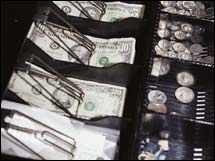|
Spending slumps in August Personal income in line with forecasts, but key inflation reading in report meets expectations. NEW YORK (CNNMoney.com) -- Americans spent less than expected in August, according to a government report Friday that also showed a closely watched inflation reading in line with Wall Street expectations. Spending by consumers rose 0.1 percent in August, compared with a 0.8 percent gain in July, according to the Commerce Department report. In inflation-adjusted dollars, spending actually slipped 0.1 percent.
Economists surveyed by Briefing.com had forecast a 0.2 percent rise in August before adjusting for a rise in prices. August is a key month for retailers due to back-to-school shopping. Major retail chains had reported a mixed bag in their sales results that month, with No. 1 retailer Wal-Mart Stores (Charts) and rival Target (Charts) reporting solid sales gains, while some high profile clothing apparel retailers such as Gap (Charts) reporting a sharp drop in sales. The drop in spending adjusted for inflation was the first since September 2005. But another key inflation figure in the report was seen as a positive. The so called core PCE deflator, which measures prices paid by consumers for goods other than food and energy, was up 0.2 percent in the month, compared to the 0.1 percent rise in July. But that reading was in line with economists' forecasts, though. The price reading is one of those closely watched by Federal Reserve policymakers as they work to keep inflation in check. "It's a market friendly report," said Anthony Chan, chief economist for JPMorgan Private Client Services. "It says spending is under control. In an environment where people are worried about inflation, you want this kind of reading on spending to assure the Fed that the economy isn't getting too hot. This helps keep the Fed on hold." The report also showed that personal income in the period rose 0.3 percent in August, in line with forecasts and down from the 0.5 increase in July. And much of that gain was due to benefits, rather than wages, which rose only 0.1 percent in August after posting a 0.6 percent gain each of the previous two months. The lower wage gain, while not necessarily good news for workers, was also seen as a positive by economists concerned that a tighter labor market could spur more wage gains and Fed rate hikes, along with lower corporate profits. "Compensation is not getting out of control," said Chan. Savings were still negative, as the report showed Americans spending $100.50 for every $100 of after-tax income they received. But that savings deficit narrowed slightly from $100.70 of spending on that basis in July. |
|

